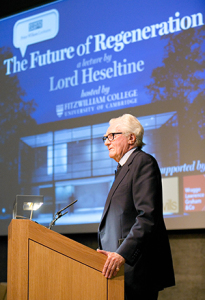 Lord Heseltine looked back on a 40-year career to outline the ideas that continue to power regeneration today, as he delivered the inaugural Estates Gazette/Peter Wilson lecture in Cambridge
Lord Heseltine looked back on a 40-year career to outline the ideas that continue to power regeneration today, as he delivered the inaugural Estates Gazette/Peter Wilson lecture in Cambridge
Michael Heseltine. Former secretary of state. The granddaddy of regeneration. One man, three equally impressive appellations.
It should come as little surprise, then, that the auditorium of Fitzwilliam College, Cambridge, was packed with 200 real estate and regeneration specialists, academics, students and property’s great and good as the Conservative politician spoke on the future of regeneration at the inaugural Estates Gazette/Peter Wilson Lecture last week.
Heseltine, known for promoting leadership, co-operation and competition to revitalise deprived parts of the UK, said these values remained vital. But first he looked back on a 40-year political career to the point where he started championing urban regeneration.
“I can tell you where it all began,” he said. “It was an extraordinary, intuitive moment.
“I was appalled by the development of the South Bank. So I said to my officials, ‘this can’t go on’. I wanted to create an urban development corporation to take out the South Bank and get a masterplan and an exciting visual concept. Word must have got around because they moved me to be minster of aerospace in very short order.”
It was not until he became secretary of state in 1979 that he finally got the chance to deliver his vision. “On my first day I took my permanent secretary out for lunch at the Connaught. I gave him an envelope and on the back of it were my priorities as secretary of state. And top of the list was an urban development corporation for east London. I said, ‘You will find in the files from 1973 a proposal to take over the South Bank. I have modified my proposal and I would now like to take over 6,000 acres of east London’.”
Heseltine went on to make urban development a central feature of his career, and London and Liverpool his personal responsibilities – he highlighted the latter as the birthplace of the public-private partnership. “In 1979 it was a revolution. Today it is a central theme of government,” he said.
He added that these, and other deprived areas of the UK, were united by a lack of direction. “There were no leaders,” said Heseltine. “There was no point at which you could put your foot on a rock and say, ‘Let’s build on that,’ because the rock was on sand.”
He highlighted that this lack of leadership remains a problem today. But he is convinced it is an issue that can be solved, in part, by the democratic election of mayors – an idea he proposed to David Cameron and a role ably carried out by George Ferguson in Bristol and Joe Anderson in Liverpool. “The elected mayor is the universally adopted model, and I believe that we should go for it here,” he said.
Speaking to EG after the lecture, Andrew Gould, the former UK chief executive of JLL and now a partner at Genr8 Developments, which delivers large-scale mixed-use regeneration schemes, agrees that leadership is crucial.
“What every city needs is business leaders, civic leaders and business-minded civic leadership. Whether that is through a mayor or some other way of doing it, I don’t think it matters too much,” he said.
Heseltine highlighted local enterprise partnerships as another huge step forward. “They are now under the direct leadership of the chancellor, and are becoming a serious part of the way England is governed. There are 39 of them. Greg Clark announced, a few months ago, the first £6bn of support to these LEPs, and another £2bn was added to it. Now, this is not new money. This is simply taking money that was being spent within the monopolies of Whitehall – housing, transport, skills, whatever – and putting it into one pot, and saying to the local authorities, ‘This is not coming to you automatically. You’ve got to show what you will do with it and what you will add to it’.”
Robin Butler, chief executive of Urban & Civic, who was also in the audience, said not all LEPs are equally successful. “There is a discrepancy between how LEPs work. There are the ones that have large-scale tenants in the enterprise zone, which gives them a base to work from, and the ones that haven’t. That’s a big difference,” he said.
The way to rectify this is to provide incentives and competition, as Heseltine did with his City Challenge Funds. In his words, these created “ladders of aspiration” by asking authorities to compete for money.
Jackie Sadek, a self-confessed “Heseltinian”, agreed. “The real world is about competition. Evolution of the species was about competition. Life is a competition. Localism means some areas will win and some will lose. Deal with it.”
It was an emotional (on the subject of Liverpool, a city close to Heseltine’s heart) 45-minute address, delivered without notes.
Before urging the property industry to make the most of the plethora of opportunities to achieve similar great feats of regeneration, Heseltine said: “There is money like you have never seen in the world today. What we need to do is focus it.”
The EG/Peter Wilson Lecture was hosted by Fitzwilliam College and supported by Savills and Wragge Lawrence Graham & Co
Listen to a podcast of Lord Heseltine’s lecture >>
Download a full transcript of Lord Heseltine’s lecture>>











